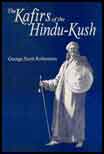|
un libro per sognare |
||
|
23/11/2024 14:08:35 |
||
|
Indietro
- torna all'elenco |
||
Conosci la Guida On Line al Pakistan di Marco?
|
The Kafirs of the Hindu-Kush Robertson George Scott 
| ||||||||
|
Editeur - Casa editrice |
Lawrence and Bullen Ltd. | |||||||
|
CittÓ - Town - Ville |
London | |||||||
|
Anno - Date de Parution |
1896 | |||||||
|
Pagine - Pages |
648 | |||||||
|
Titolo originale |
The Kafirs of the Hindu-Kush | |||||||
|
Lingua - language - langue |
eng | |||||||
|
Ristampa - RÚÚdition - Reprint |
Kessinger Publishing, LLC (January 17, 2007) | |||||||
|
|
||||||||
|
|
|
|
| |

|
Amazon.com (United States) - order this book The Kafirs of the Hindu-Kush |
||
|
| ||||||||
|
The present work is a record of journey of George Scott Robertson to Kafiristan during 1890-91. He was then a British agent at Gilgit. This work also describes the wild and interesting inhabitants that he encountered during his one-year journey in the Hindu-Kush.
|
||||||||
| Recensione in altra lingua (English): | ||||||||
|
From the preface: "In the year 1888, in company with Colonel Durand, C.B., then a young cavalry captain, I was travelling through the Astor Valley of Kashmir to Gilgit. On one memorable occasion we had made a double march. The track was extremely arduous, and the waning light found us tired and jaded, and still some distance from camp. Silent and slow-footed, we rounded the Doian spur in the gathering darkness, and had begun the descent to the village, when a strange sight to the north-west startled us into open-eyed wonder. And indeed a wonderful picture lay spread out before and beneath us. It was bounded and restricted below by the large spurs which guard the mouth of the Astor Valley. Above, the pure sky domed over all, while in front a filmy veil of cloud was suspended, which seemed to magnify and accentuate, instead of dimming, the noble outlines which lay behind. Through this mysterious curtain could be seen a bold curve of the Indus flanked by mighty mountains, and the light yellowish-grey shades of the Sai Valley, which increased the general appearance of dream-like unreality. Beyond this, again, were the dark mountain ranges of the gloomy Gilgit region, divided by equally sombre ravines, while the eternal snows of the lovely Rakhipushi, calm and brooding, with a single cloud pennon streaming from its solitary peak, completed a background of surpassing beauty. The whole scene was illuminated by a dying afterglow. Swiftly, almost instantaneously, the light failed, and the translucent veil deepened and darkened so rapidly, that the vision like picture was shut out almost as magically as it had flashed forth upon our senses. | ||||||||
| Biografia | ||||||||
|
Sir George Scott Robertson (October 22, 1852 - January 1, 1916) was a British soldier, author, and administrator who was best known for his arduous journey to the remote and rugged region of Kafiristan in what is now northeastern Afganistan. He chronicled his Kafiristan experience in the book The Kafirs of the Hindu-Kush. Some have suggested that Robertson's year-long expedition and subsequent book (originally published in 1896) provided background and inspiration for Rudyard Kipling's short story The Man Who Would Be King. However, Kipling's work was originally published in 1888, predating Robertson's travels to the region. | ||||||||
| ||||||||

 The Kafirs of the Hindu-Kush
The Kafirs of the Hindu-Kush